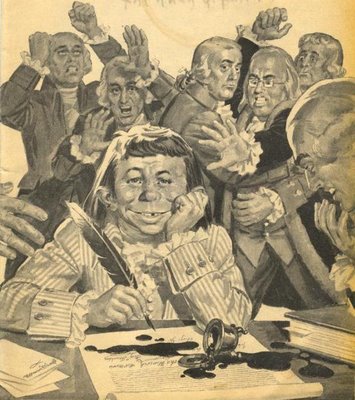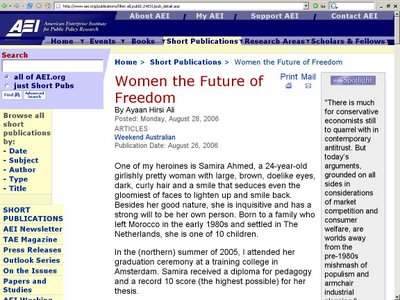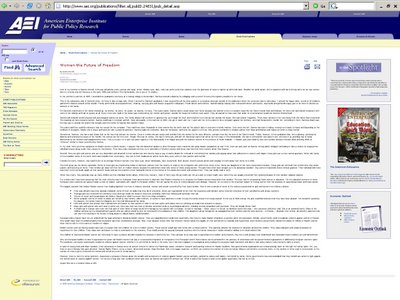Ayaan Hirsi Ali is a resident fellow at AEI.
Founding fathers of modern Philosophy Voltaire and Erasmus Are Spinning in their Graves.
American Enterprise Institute, 1150 17th St., NW; 202-862-5800; aei.org est. 1943 What it is: Public-policy think tank, one of Washingtonian GREAT PLACES TO WORK and concentrated power. Number of employees: 142
The Religion of Our Founders Among the 89 signers of the Declaration and/or the Constitution, nearly a dozen had studied theology, were ordained ministers, were preachers though not ordained, were chaplains to a militia unit, or were officers of national Bible societies and the like. Historians of the last hundred years have been remiss in their study of the religion of the Founders. We urgently need good studies of all of them, if we wish to have a fairer idea of the faith of the Founders.
Pdf doc at As Thomas Jefferson famously opined, “Enlighten the people generally, and tyranny and oppressions of body and mind will vanish like evil spirits at the dawn of day.”
Jefferson was in good company, with founders like Benjamin Franklin, George Washington, and Benjamin Rush repeatedly uttering similar sentiments. Jefferson’s admonition that freedom and education are interconnected is especially timely in a world where religious
questions are interwoven with international relations, where observers on the right and left worry about a coarse and fraying culture in which individuals use the web to form virtual communities of the like-minded, and where debates about assimilation and cultural conflict routinely lead the evening news ...
mad cover
 Women the Future of Freedom
Women the Future of Freedom


Let us suggest, for starters, studies about the depth of the Christian faith of George Sherman; Samuel Huntington; William Williams; the Carroll cousins Charles, Daniel, and John; Hugh Williamson; Robert Treat Paine; William Paca; John Dickinson; Rufus King; William Livingston; John Hancock; Benjamin Rush; Patrick Henry; James Wilson; and George Mason. Evidence does suggest that Thomas Jefferson, Benjamin Franklin, and James Monroe may have been the least religious of the top 100 Founders. James Madison is harder to be exact about, without a very close study, because many of the motives for his initial resistance, as president, to pay for chaplains for the military, or to issue thanksgiving proclamations, were themselves religious. He feared that government would corrupt religion.
From the washingtonian.com GREAT PLACES TO WORK American Enterprise Institute
What it is: Public-policy think tank. Number of employees: 142.
Interesting perk: A top-floor dining room with waitstaff serves three-course gourmet lunches for $4, 50-cent breakfasts, and free muffins and cookies.
Perhaps it’s no surprise that at a right-of-center think tank, the healthcare plan is structured with a good dose of personal responsibility. AEI employees can choose one of three coverage options—two of which provide incentive to monitor medical spending, as the employee gets money back if a certain deductible is not met.
AEI, founded in 1943, is one of the country’s oldest think tanks. It researches everything from trade to social welfare to tax policy. Among its 55 scholars and fellows are such conservative icons as Lynne Cheney, Newt Gingrich, Jeane Kirkpatrick, Irving Kristol, and Richard Perle.
“AEI is a very stimulating intellectual environment,” says research assistant Bryan O’Keefe. “This is an excellent atmosphere for somebody who cares about big ideas.”
It’s a policy wonk’s dream. Employees can get free books written by its scholars, and there are frequent lectures and panels. People may spend the day thinking and reading.
There are less-scholarly pursuits: weekly happy hours, an annual black-tie dinner, a Fourth of July party on the roof, and a softball team whose name is decided each year by a contest. This past summer the name on players’ T-shirts was the Nationalists; last year, the Preemptive Strikes.
Like most think tanks, AEI has a barbell-shaped workforce—scholars at one end and, at the other, young staffers who stay a few years and then move on or go back to school. It’s rare for a research assistant to be promoted to scholar, but AEI offers a chance to meet big names and count them as references. “AEI is a great place to launch a career,” says executive vice president David Gerson.
In another nod to personal responsibility, AEI rewards merit, not tenure, with raises of 0 to 30 percent.
In 1943, Lewis H. Brown, then chairman of the board of Johns-Manville Corp. formed the AEI. The think tank was created to serve as a platform for policy recommendations that serve the interest of America’s largest industrial concerns.
Today, the AEI’s Board of Trustees still lists representative magnates from the traditional manufacturing, transportation and natural resource sectors such as: Lee R. Raymond, vice chairman, chairman and CEO (Retired), Exxon Mobil Corp.; John V. Faraci, chairman and CEO, International Paper Co.; Martin M. Koffel, chairman and CEO, URS Corp.; John A. Luke, Jr., chairman and CEO MeadWestvaco Corp.; and William S. Stavropoulos, chairman, Dow Chemical Co.
Nevertheless, over the years, financial services, health and pharmaceutical concerns have taken up a greater share of the seats on the board of trustees. To those with an interest in insurance, it is difficult to look past the name of Edward B. Rust, Jr., chairman and CEO, State Farm Insurance Companies on the list of trustees. The financial services sector also lists AEI board members like Harvey Golub, chairman and CEO (Retired), American Express Company, among others trustees. With regard to health care financing and pharmaceutical perspectives Wilson H. Taylor, chairman emeritus, CIGNA Corp.: L. Ben Lytle, chairman and CEO, AXIA Health Management, LLC, and Raymond V. Gilmartin, special adviser to the executive committee Merck & Co., Inc.
Traditionally, the AEI has favored candidates for its board and officer positions who hold both governmental experience and/or impeccable political networks. At least two former Treasury secretaries, William Simon and Paul O’Neill, have served on the AEI board. So has Vice President Richard Cheney.
The prototypical AEI activist might be the group’s current president, Christopher DeMuth. He served as staff assistant to President Richard M. Nixon (1969-1970) and then moved to the Office of Management and Budget. Two years after leaving the WhiteHouse, his formal resumé picks up as an attorney for a lobbying law firm. During the Carter Administration, DeMuth worked for transportation concerns. In 1981, he became executive director of a presidential commission on deregulation. He became president of the AEI in 1986, where he also served as editor of a journal advocating business deregulation.
DeMuth’s direct interest in insurance seems to have taken off in a big way when he was named to the board of the Insurance Services Office (ISO), serving from 1992-1996. Since 2004, DeMuth has served on the board of State Farm Mutual Automobile Insurance Co.
With assets, experience and power of the type that the AEI commands, the think tank has grown accustomed to winning.
American Enterprise Institute, 1150 17th St., NW; 202-862-5800; aei.org est. 1943 What it is: Public-policy think tank, one of Washingtonian GREAT PLACES TO WORK and concentrated power. Number of employees: 142
The Religion of Our Founders Among the 89 signers of the Declaration and/or the Constitution, nearly a dozen had studied theology, were ordained ministers, were preachers though not ordained, were chaplains to a militia unit, or were officers of national Bible societies and the like. Historians of the last hundred years have been remiss in their study of the religion of the Founders. We urgently need good studies of all of them, if we wish to have a fairer idea of the faith of the Founders.
Pdf doc at As Thomas Jefferson famously opined, “Enlighten the people generally, and tyranny and oppressions of body and mind will vanish like evil spirits at the dawn of day.”
Jefferson was in good company, with founders like Benjamin Franklin, George Washington, and Benjamin Rush repeatedly uttering similar sentiments. Jefferson’s admonition that freedom and education are interconnected is especially timely in a world where religious
questions are interwoven with international relations, where observers on the right and left worry about a coarse and fraying culture in which individuals use the web to form virtual communities of the like-minded, and where debates about assimilation and cultural conflict routinely lead the evening news ...
mad cover

 Women the Future of Freedom
Women the Future of Freedom

Let us suggest, for starters, studies about the depth of the Christian faith of George Sherman; Samuel Huntington; William Williams; the Carroll cousins Charles, Daniel, and John; Hugh Williamson; Robert Treat Paine; William Paca; John Dickinson; Rufus King; William Livingston; John Hancock; Benjamin Rush; Patrick Henry; James Wilson; and George Mason. Evidence does suggest that Thomas Jefferson, Benjamin Franklin, and James Monroe may have been the least religious of the top 100 Founders. James Madison is harder to be exact about, without a very close study, because many of the motives for his initial resistance, as president, to pay for chaplains for the military, or to issue thanksgiving proclamations, were themselves religious. He feared that government would corrupt religion.
What it is: Public-policy think tank. Number of employees: 142.
Interesting perk: A top-floor dining room with waitstaff serves three-course gourmet lunches for $4, 50-cent breakfasts, and free muffins and cookies.
Perhaps it’s no surprise that at a right-of-center think tank, the healthcare plan is structured with a good dose of personal responsibility. AEI employees can choose one of three coverage options—two of which provide incentive to monitor medical spending, as the employee gets money back if a certain deductible is not met.
AEI, founded in 1943, is one of the country’s oldest think tanks. It researches everything from trade to social welfare to tax policy. Among its 55 scholars and fellows are such conservative icons as Lynne Cheney, Newt Gingrich, Jeane Kirkpatrick, Irving Kristol, and Richard Perle.
“AEI is a very stimulating intellectual environment,” says research assistant Bryan O’Keefe. “This is an excellent atmosphere for somebody who cares about big ideas.”
It’s a policy wonk’s dream. Employees can get free books written by its scholars, and there are frequent lectures and panels. People may spend the day thinking and reading.
There are less-scholarly pursuits: weekly happy hours, an annual black-tie dinner, a Fourth of July party on the roof, and a softball team whose name is decided each year by a contest. This past summer the name on players’ T-shirts was the Nationalists; last year, the Preemptive Strikes.
Like most think tanks, AEI has a barbell-shaped workforce—scholars at one end and, at the other, young staffers who stay a few years and then move on or go back to school. It’s rare for a research assistant to be promoted to scholar, but AEI offers a chance to meet big names and count them as references. “AEI is a great place to launch a career,” says executive vice president David Gerson.
In another nod to personal responsibility, AEI rewards merit, not tenure, with raises of 0 to 30 percent.
In 1943, Lewis H. Brown, then chairman of the board of Johns-Manville Corp. formed the AEI. The think tank was created to serve as a platform for policy recommendations that serve the interest of America’s largest industrial concerns.
Today, the AEI’s Board of Trustees still lists representative magnates from the traditional manufacturing, transportation and natural resource sectors such as: Lee R. Raymond, vice chairman, chairman and CEO (Retired), Exxon Mobil Corp.; John V. Faraci, chairman and CEO, International Paper Co.; Martin M. Koffel, chairman and CEO, URS Corp.; John A. Luke, Jr., chairman and CEO MeadWestvaco Corp.; and William S. Stavropoulos, chairman, Dow Chemical Co.
Nevertheless, over the years, financial services, health and pharmaceutical concerns have taken up a greater share of the seats on the board of trustees. To those with an interest in insurance, it is difficult to look past the name of Edward B. Rust, Jr., chairman and CEO, State Farm Insurance Companies on the list of trustees. The financial services sector also lists AEI board members like Harvey Golub, chairman and CEO (Retired), American Express Company, among others trustees. With regard to health care financing and pharmaceutical perspectives Wilson H. Taylor, chairman emeritus, CIGNA Corp.: L. Ben Lytle, chairman and CEO, AXIA Health Management, LLC, and Raymond V. Gilmartin, special adviser to the executive committee Merck & Co., Inc.
Traditionally, the AEI has favored candidates for its board and officer positions who hold both governmental experience and/or impeccable political networks. At least two former Treasury secretaries, William Simon and Paul O’Neill, have served on the AEI board. So has Vice President Richard Cheney.
The prototypical AEI activist might be the group’s current president, Christopher DeMuth. He served as staff assistant to President Richard M. Nixon (1969-1970) and then moved to the Office of Management and Budget. Two years after leaving the WhiteHouse, his formal resumé picks up as an attorney for a lobbying law firm. During the Carter Administration, DeMuth worked for transportation concerns. In 1981, he became executive director of a presidential commission on deregulation. He became president of the AEI in 1986, where he also served as editor of a journal advocating business deregulation.
DeMuth’s direct interest in insurance seems to have taken off in a big way when he was named to the board of the Insurance Services Office (ISO), serving from 1992-1996. Since 2004, DeMuth has served on the board of State Farm Mutual Automobile Insurance Co.
With assets, experience and power of the type that the AEI commands, the think tank has grown accustomed to winning.
Labels: aei, public policy
0 Comments:
Post a Comment
<< Home